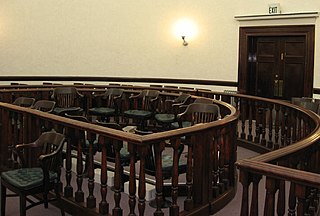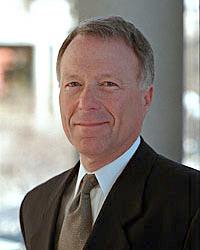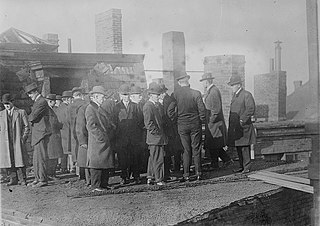A grand jury is a jury—a group of citizens—empowered by law to conduct legal proceedings, investigate potential criminal conduct, and determine whether criminal charges should be brought. A grand jury may subpoena physical evidence or a person to testify. A grand jury is separate from the courts, which do not preside over its functioning.
An indictment is a criminal accusation that an individual has committed a crime. In jurisdictions that use the concept of felonies, the most serious criminal offence is a felony; jurisdictions that do not use the felonies concept often use that of an indictable offence, an offence that requires an indictment.

A jury trial, or trial by jury, is a lawful proceeding in which a jury makes a decision or findings of fact. It is distinguished from a bench trial in which a judge or panel of judges makes all decisions.

A jury is a sworn body of people convened to render an impartial verdict officially submitted to them by a court, or to set a penalty or judgment. Juries developed in England during the Middle Ages, and are a hallmark of the Anglo common law legal system. They are still commonly used today in the United Kingdom, the United States, Canada, Australia, and other countries whose legal systems are descended from English and later British legal traditions.
Jury nullification (US/UK), jury equity (UK), or a perverse verdict (UK) describes a not guilty verdict of a criminal trial's jury despite a defendant having clearly broken the law. Reasons may include beliefs that: the law itself is unjust, the prosecutor has misapplied the law in the defendant's case, the punishment for breaking the law is too harsh, or general frustrations with the criminal justice system. Some juries have also refused to convict due to their own prejudices in favor of the defendant. Such verdicts are possible because a jury has an absolute and unqualified right to reach any verdict it chooses, although they are usually not told of this right in the process of a trial.
Attorney–client privilege or lawyer–client privilege is the name given to the common law concept of legal professional privilege in the United States. Attorney–client privilege is "[a] client's right to refuse to disclose and to prevent any other person from disclosing confidential communications between the client and the attorney."
In United States law, a motion is a procedural device to bring a limited, contested issue before a court for decision. It is a request to the judge to make a decision about the case. Motions may be made at any point in administrative, criminal or civil proceedings, although that right is regulated by court rules which vary from place to place. The party requesting the motion may be called the moving party, or may simply be the movant. The party opposing the motion is the nonmoving party or nonmovant.
A hung jury, also called a deadlocked jury, is a judicial jury that cannot agree upon a verdict after extended deliberation and is unable to reach the required unanimity or supermajority. Hung jury usually results in the case being tried again.
Unanimity is agreement by all people in a given situation. Groups may consider unanimous decisions as a sign of social, political or procedural agreement, solidarity, and unity. Unanimity may be assumed explicitly after a unanimous vote or implicitly by a lack of objections. It does not necessarily mean uniformity and can sometimes be the opposite of majority in terms of outcomes.

The lynching of Michael Donald in Mobile, Alabama, on March 21, 1981, was one of the last reported lynchings in the United States. Several Ku Klux Klan (KKK) members beat and killed Michael Donald, a 19-year-old African-American, and hung his body from a tree. One perpetrator, Henry Hays, was executed by electric chair in 1997, while another, James Knowles, was sentenced to life in prison after pleading guilty and testifying against Hays. A third man was convicted as an accomplice and also sentenced to life in prison, and a fourth was indicted but died before his trial could be completed.
The Federal Rules of Criminal Procedure are the procedural rules that govern how federal criminal prosecutions are conducted in United States district courts and the general trial courts of the U.S. government. They are the companion to the Federal Rules of Civil Procedure. The admissibility and use of evidence in criminal proceedings is governed by the separate Federal Rules of Evidence.
Pay grades are used by the eight uniformed services of the United States to determine wages and benefits based on the corresponding military rank of a member of the services. While different ranks may be used among the eight uniformed services, pay grades are uniform and equivalent between the services and can be used to quickly determine seniority among a group of members from different services. They are also essential when determining a member's entitlements such as basic pay and allowances.

I. Lewis "Scooter" Libby is an American lawyer, and former chief of staff to Vice President Dick Cheney.

The Fifth Amendment to the United States Constitution addresses criminal procedure and other aspects of the Constitution. It was ratified, along with nine other articles, in 1791 as part of the Bill of Rights. The Fifth Amendment applies to every level of the government, including the federal, state, and local levels, in regard to a US citizen or resident of the US. The Supreme Court furthered the protections of this amendment through the Due Process Clause of the Fourteenth Amendment.
United States criminal procedure derives from several sources of law: the baseline protections of the United States Constitution, federal and state statutes; federal and state rules of criminal procedure ; and state and federal case law. Criminal procedures are distinct from civil procedures in the US.
Jury nullification in the United States has its origins in colonial America under British law. In the United States, jury nullification occurs when a jury in a criminal case reaches a verdict contrary to the weight of evidence, sometimes because of a disagreement with the relevant law. The American jury draws its power of nullification from its right to render a general verdict in criminal trials, the inability of criminal courts to direct a verdict no matter how strong the evidence, the Fifth Amendment's Double Jeopardy Clause, which prohibits the appeal of an acquittal, and the fact that jurors cannot be punished for the verdict they return.
The Double Jeopardy Clause of the Fifth Amendment to the United States Constitution provides: "[N]or shall any person be subject for the same offence to be twice put in jeopardy of life or limb..." The four essential protections included are prohibitions against, for the same offense:
A citizen’s right to a trial by jury is a central feature of the United States Constitution. It is considered a fundamental principle of the American legal system.

Grand juries in the United States are groups of citizens empowered by United States federal or state law to conduct legal proceedings, chiefly investigating potential criminal conduct and determining whether criminal charges should be brought. The grand jury originated under the law of England and spread through colonization to other jurisdictions as part of the common law. Today, however, the United States is one of only two jurisdictions, along with Liberia, that continues to use the grand jury to screen criminal indictments.
The no-impeachment rule is a part of U.S. evidence law that generally prohibits jurors from testifying about their deliberations in an attempt to discredit a verdict. Arising in British common law, the rule has come to be implemented in Federal Rule of Evidence (FRE) 606(b) and in each state.





